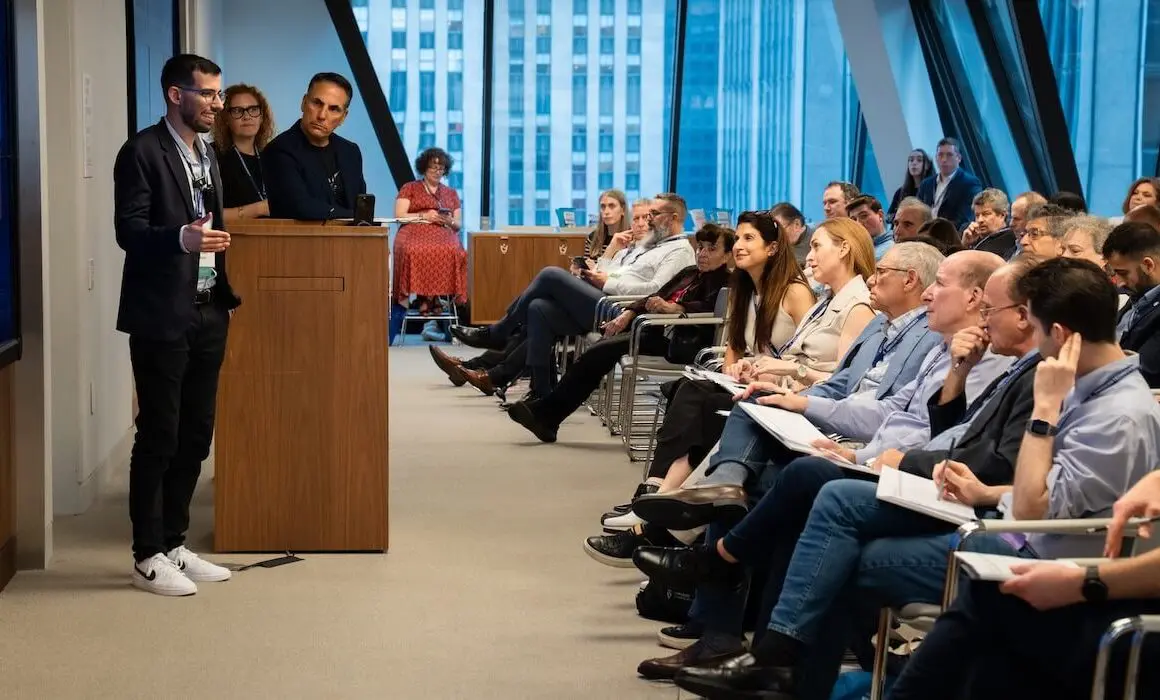A “Runway” to a Better Startup World

Postdocs Share How the Startup Program Supercharged Their Innovations
Celebrating its 10th anniversary, the Joan and Irwin Jacobs Technion-Cornell Institute at Cornell Tech on Roosevelt Island has become part of New York City’s higher education landscape. Through its Runway Startup Postdoc Program, it has also injected entrepreneurial energy into the city.
Runway, launched in 2014, helps recent Ph.D. graduates with an entrepreneurial bent transition into the high-powered world of startups. Students describe Runway as part business school, part research lab, and part startup incubator. The two-year program combines workshops on building a business with mentorship from industry experts, while also providing a salary, research budget, housing allowance, and space to create.
The impact of Runway’s hands-on approach speaks for itself: In less than eight years, the program has launched more than 30 startups, created nearly 200 new jobs, and generated at least 26 new patents.
“Without Runway, I doubt I could be an entrepreneur, to be 100% honest,” reflected Ali Khaloo, a structural engineer who graduated the program in 2021.
“I was at that transition in life,” he said about moving from academia into the startup world, “and there were few places looking for those kinds of people.” Runway, he said, provided him the resources and time to “start a business and hit the ground running. Runway is unique in that they really support you to go all the way. No other program has that kind of mentality.”
Khaloo was 12 years old when he was traveling with his family in Istanbul, Turkey, and witnessed an earthquake. “Within seconds you could see so many bridges and buildings that fell apart and killed people,” he recalled. He has been passionate about engineering ever since and entered Runway with the goal of tackling the problems that come with aging civil infrastructure.
“Infrastructure globally is crumbling,” he said. “Assets that we use on a daily basis, mostly built after World War II, are not safe. They are falling apart, and they’re putting the lives of people in danger.” So Khaloo invented a cloud-based solution that takes images, videos, laser scans, and other subsurface sensors of a bridge, road, or building and creates a highly detailed 3D “digital twin.” Next, a patented AI-powered technology is used to identify and quantify current damages or areas of weakness, along with maintenance plans to prevent future failures.
Runway gave Khaloo the resources to turn this ingenious solution into Aren, an award-winning startup working across the globe to build a digital health record of our roads and bridges, ensuring the safety of the infrastructure we rely on every day. “I can only speak highly of Runway and the support they provide. And that support continues, even after graduating. I still get introductions to meet with people or potential investors who could help my business,” said Khaloo.
Fellow Runway graduate Colin Plover was also struck by the community Runway provided him as a new entrepreneur. “This work is complicated and difficult even when you’re trained to do it, and I hadn’t been trained to do it,” he said. “Having peer groups, advising, and an environment that helped encourage me and move me along was a huge opportunity. It opened doors that weren’t available to me before.”
Plover was inspired to go into nursing in part because his aunt was a nurse. “Nurses are the backbone of healthcare systems,” he said. “They are the most numerous healthcare providers, providing the majority of care, and they are the ones connecting with patients and families at the bedside 24/7.”
A medical-surgical nurse, Plover is now a postdoctoral fellow in Runway researching health systems. He chose the program to help him translate his research and desire to make an impact into Nightingale — a software, research, and analytics company that helps nurses improve the efficiency of care delivery and patient outcomes.
“The impetus for this came when I was working at the bedside as a nurse, and pursuing my Ph.D., wrestling with the contradiction that we wanted nurses to be practicing at the highest level of their capabilities, and we want nurses to be with patients. But we were spending too much of our time not providing direct patient care because we were burdened with logistics, charting, and non-direct patient care tasks,” said Plover. Also, most hospitals didn’t have the bandwidth or the technology to collect and analyze data that could provide insights to improve patient care.
Runway is helping Plover move quickly from ideation to working directly with hospitals. He hopes that many healthcare systems will soon be using Nightingale’s software to help nurses tackle a host of operations more efficiently. In addition, institutions are giving Plover access to their data so Nightingale can analyze the information and help make more data-driven and evidence-based care delivery decisions for better outcomes.
Thanks to Aren, we can trust that the roads, bridges, and buildings we use every day are safe and well-maintained. Because of Nightingale, nurses now have a powerful tool at their disposal to serve their patients, families, and communities. These are just two examples of how Runway moves innovative ideas into the marketplace to make our lives safer, better, and healthier. Today’s challenges are complicated, and the Jacobs-Technion Cornell Institute is finding solutions and helping New York City become a vibrant technological hub.



